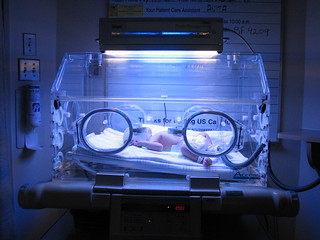
“Pack up the bili baby. He’s going across town,” barked the charge nurse to my newborn baby’s nurse.
I raised my eyebrows at her a little.
“Oh, I’m sorry. Are you the mom? I thought you were one of the students. That top totally hides your postpartum belly…” She continued trying to flatter me. But I couldn’t hear a thing.
Pack up the bili baby.
She said what she had to say to get a quick message to the nurse. But what I heard was, box him up and throw him in the back of the van.
She struck a nerve. He’s not The Bili Baby. He has a name. He has a family. He’s a little person who just started a brand new life, and he has a mother who is worried about him.
He is not a shipment to be boxed up.
I understand that newborn jaundice is common and treatable, and that his numbers were low enough that we were no longer throwing around scary-talk, like blood transfusions and brain damage and such. I understand that we had to move because he was the biggest and healthiest baby in the unit, and they needed the resources for a little guy who was in really bad shape.
I understand that we were the lucky ones in that situation.
But all of this – the cords, the wires, the beeps and the instruments – the NICU was a foreign land to me. And oh, did I mention I just became a mother? A mother. Which means I now have to protect someone. At minimum, I should make sure the ones I’m trusting with his life see him as, you know, a person.
The ambulance driver arrived and without saying a word, without so much as an introduction or a hello, pulled out the restraints and started strapping my sweet baby’s tiny limbs down. He wouldn’t look at me.
We walked toward the elevator. I was desperately trying to keep up, but I was recovering from birth and trailing behind. They all filed in, and the door almost closed without me. I had to wave the nurse out of a daze before she held the door. I was almost separated from my baby and I would have no idea where to stop to get to him.
We stepped out of the elevator into a cold garage, where the ambulance was waiting for us. The driver walked ahead of me, wheeling the bassinet. He seemed annoyed by the fact that I had to have my hand on the incubator. Irrational? Maybe. It was just my way of letting my baby know I was still there. He wore goggles, so he couldn’t see me, and he certainly couldn’t feel my hand on the glass. I was feeling helpless, and my hand on that incubator made me feel like I was mothering. I hadn’t had a chance to do much of that yet.
No sleep, unstable hormones, worry, and the sterile environment got to me. I broke down a bit.
“Why are you crying? They’re just going to keep him under the lights. It’s like sunbathing,” the NICU nurse said to me in the elevator.
“Oh, I haven’t slept in four days. I’m just really tired,” I lied, since she was telling me that I was wrong for being upset. After all, you sunbathe on vacation so this must feel like a vacation, right? One shouldn’t cry on vacation.
This trickle of a tear down my face, this quivering lip…that wasn’t crying. I wanted to cry. I wanted to bury my face into someone – anyone – and just sob. And be hugged. And be told that this isn’t fair – that I should be at home in my PJs with my new little man, flipping through Netflix and eating freezer casseroles and getting to know every little finger and toe and hair, every coo and whimper. That it’s not fair that I had to worry about him wiggling around with an IV needle in his head, or wonder why the beeps on his monitors were getting faster, or slowing down…
This wasn’t what we talked about at my baby shower, at the tables strewn with the pink and blue lollipops and coordinating napkins. This didn’t fit my image of the smiling, sleepy mom with her days-old baby in her arms, both drifting off into a blissful snuggle.
Instead, we were in a hospital unit that shrugged us off because my baby wasn’t all that sick.
I give the hospital staff credit for trying to reassure me that my baby would be fine. But, there came a point when I didn’t want to hear that this was no big deal. My baby may have been the least sick, but he was still sick and spending his first days in intensive care. Sick babies make mamas worry. Worried mamas get sad, and need comfort. They need empathy.
At the very least, they could do without the comments that make them feel like they’re crazy for being upset.



